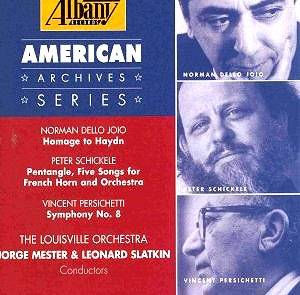The
Haydn work is the most attractive piece of Dello Joio
I have heard. Across its three movements (beautifully recorded
- as are all the tracks here) it includes Haydn-Beethoven pastiche
with a rebellious American jolt, a restfully sustained Baxian
glow (adagio) and an uproariously flickering Waltonian allegro.
Peter
Schickele ('onlie begetter' of P.D.Q. Bach) is much more than
the periwigged Clown Prince who has haunted record catalogues
since the 1960s. Schickele, the Iowan, arranges his five movements
under sub-title 'Pentangle' intending to create a resonance with
enchantment. The music's five named movements and its character
are all easy on the air without being facile. The composer intended
the five movements to approximate to the effect of a single side
of a folk-rock LP album of the 1970s from the likes of Fairport
Convention or Pentangle. The movements are songful, in the case
of Tom on the Town, grittily confrontational between soloist
and the orchestra's own horn section, humorously 'Cowboy' (Copland
rattles the dust from the rafters) and a surprise. The last movement's
mediaeval riddle song is sung at a cantering tempo in an agreeably
non-operatic male voice that suggests the sandalled and bearded
gentle folk revivalists of the 1960s. Overall this music stands
confidently between Copland folk-style and music theatre. This
is extremely attractive music if hardly profound - but then who
needs profound all the time?
Persichetti,
who has often had his premieres in his home city of Philadelphia,
has been jostled into the shade by Mennin, Piston, Hanson and
Schuman. The Eighth Symphony is easy to appreciate, pliably responsive
and lyrical with the lightest dusting of atonality, sometimes
ruffled by Beethovenian protest, and rippling restive rhythmic
material, welcoming of Schuman-style adagio writing for the strings,
accessibly chugging and chuckling, spitting and venomously triumphant
in the finale. Ultimately that finale reeks of a formula (Schuman
again) for closure rather than ringing with the conviction of
symphonic consummation; some very fine music along the way though.
Naxos should really give us the complete cycle.
Good
notes complete a pleasing picture.
Although
the Persichetti rings without outright confidence, the endearing
joshing of Schickele and the entertaining Dello Joio make this
a complete experience.
Rob
Barnett

![]() Kenneth Albrecht (french
horn)
Kenneth Albrecht (french
horn) ![]() ALBANY TROY 024 [72.11]
ALBANY TROY 024 [72.11]